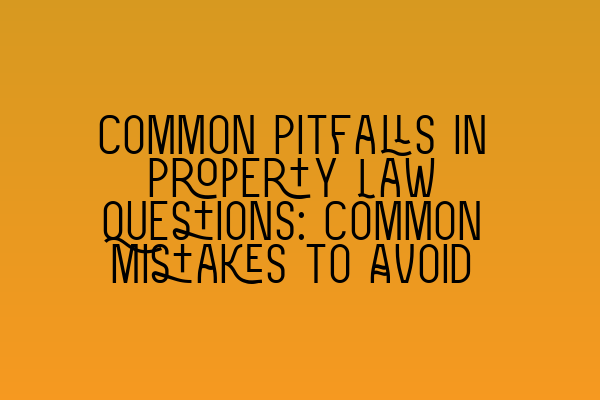Common Pitfalls in Property Law Questions: Common Mistakes to Avoid
When it comes to property law, there are a number of common pitfalls that many students and professionals can fall into. These mistakes can lead to costly errors or misunderstandings that could have been easily avoided. In this blog post, we will explore some of the most common mistakes in property law questions and provide helpful tips on how to avoid them.
1. Failing to understand the question: One of the most common mistakes in property law questions is not fully understanding what the question is asking. It is crucial to carefully read and analyze the question, paying close attention to the specific facts and issues raised. Take the time to identify the key legal principles at play and ensure that your answer directly addresses them. If you are unsure about any aspect of the question, don’t hesitate to seek clarification.
2. Neglecting to consider all relevant legal principles: Property law is a complex field with a wide range of legal principles and statutes. It is important to consider all relevant rules and authorities that may apply to the given scenario. Students and professionals often make the mistake of relying solely on their memory or preconceived notions of the law without conducting thorough research. By conducting comprehensive legal research, you can ensure that your answer is well-supported and accurate.
3. Failing to apply the law to the facts: Another common pitfall is failing to apply the relevant legal principles to the specific facts of the problem. It is not enough to simply state the law; you must also demonstrate how it applies to the given scenario. Carefully analyze the facts and explain how they align with or diverge from the legal principles you have identified. Providing detailed explanations and examples will strengthen your answer and showcase your understanding of the law.
4. Ignoring alternative viewpoints: Property law is not always clear-cut, and there may be multiple interpretations or perspectives on a particular issue. Failing to acknowledge or address alternative viewpoints can weaken your argument and demonstrate a lack of critical thinking. When addressing a property law question, consider different arguments and perspectives, highlighting the strengths and weaknesses of each. This will showcase your ability to think critically and make a well-rounded argument.
5. Lack of organization: A poorly structured answer can make it difficult for the reader to follow your reasoning and understand your conclusions. To avoid this, organize your response into clear and logical sections, with headings or subheadings to indicate your points. Additionally, use appropriate paragraph breaks and transition words to create a cohesive flow of ideas. This will make your answer more digestible and allow the reader to easily navigate through your analysis.
6. Not practicing past exam questions: Practice makes perfect, and this applies to property law questions as well. By practicing past exam questions, you can familiarize yourself with the format, style, and content of property law assessments. This will not only improve your understanding of the subject matter but also help you manage your time effectively during an exam. Remember to review the model answers to gain insights into the key elements of a successful response.
Avoiding these common pitfalls will greatly enhance your performance in property law questions. By understanding the importance of careful analysis, comprehensive research, application of the law to facts, consideration of alternative viewpoints, and effective organization, you can improve your ability to provide accurate and well-reasoned answers.
At SQE Property Law & Land Law, we offer comprehensive preparation courses for both the SQE 1 and SQE 2 exams. Our courses are designed to equip you with the knowledge and skills necessary to excel in property law assessments. We also provide practice exam questions and mock exams that simulate the real exam experience. By enrolling in our SQE preparation courses, you can confidently approach property law questions and avoid the common mistakes discussed in this blog post.
For additional practice resources, we recommend checking out our SQE 1 Practice Exam Questions and Practice Mocks FLK1 FLK2 articles. These resources will provide you with valuable practice opportunities to strengthen your property law knowledge and problem-solving skills.
Don’t forget to mark your calendar with the upcoming SRA SQE Exam Dates. Being aware of the exam schedule will help you plan your studies and preparation effectively.
If you are interested in learning more about our SQE 1 and SQE 2 preparation courses, visit our SQE 1 Preparation Courses and SQE 2 Preparation Courses pages. Our expert tutors are committed to providing you with the best possible guidance and support throughout your SQE journey.
In conclusion, by avoiding the common pitfalls outlined in this blog post and engaging in thorough preparation, you can greatly improve your performance in property law questions. Remember to approach each question with a careful and analytical mindset, supported by comprehensive research and organized reasoning. Best of luck in your future property law assessments!
